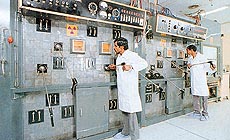More Thoughts on Nuclear Energy
Unfortunately, the use of nuclear power poses a risk that will not easily be resolved. That risk is global security. As history has taught us, nuclear power can be used as a source of energy or as a deadly weapon. As long as conflicts exist between nations with the capability to produce nuclear energy, that threat will remain. This threat mars the face of scientific progress. Nuclear weapons may ensure the safety of one country, but they jeopardize the well-being of another.
 Don't get me wrong, I think that nuclear weapons are a necessary evil, but I am still saddened by the inevitable threat that they will always pose. The Nuclear Information and Resource Service "...aims to educate wider audiences about the connection between nuclear power and nuclear weapons and the parallel pathways to a safer world free from these dual dangers."
Don't get me wrong, I think that nuclear weapons are a necessary evil, but I am still saddened by the inevitable threat that they will always pose. The Nuclear Information and Resource Service "...aims to educate wider audiences about the connection between nuclear power and nuclear weapons and the parallel pathways to a safer world free from these dual dangers." 
For more information, please visit their website at http://www.nirs.org/
What countries encourage further exploration of the peaceful use of nuclear power?
Australia, France, Japan, the Slovak Republic, Austria, Germany, Korea, Spain, Belgium, Greece, Luxembourg, Sweden, Canada, Hungary, Mexico, Switzerland, Czecch Republic, Iceland, Netherlands, Turkey, Denmark, Ireland, Norway, United Kingdom, Finland, Italy, Portugal, and the United States are all members of the Nuclear Energy Agency, the NEA. Together these countries make up about "...85% of the world's installed nuclear power."
 The current membership includes "...28 countries, in Europe, North America and the Asia-Pacific region." "The Nuclear Energy Agency (NEA) is a specialized agency within the Organization for Economic Co-operation and Development (OECD), an intergovernmental organization of industrialised countries, based in Paris, France."
The current membership includes "...28 countries, in Europe, North America and the Asia-Pacific region." "The Nuclear Energy Agency (NEA) is a specialized agency within the Organization for Economic Co-operation and Development (OECD), an intergovernmental organization of industrialised countries, based in Paris, France."
 The NEA's mission "... is to assist its Member countries in maintaining and further developing, through international co-operation, the scientific, technological and legal bases required for the safe, environmentally friendly and economical use of nuclear energy for peaceful purposes."
The NEA's mission "... is to assist its Member countries in maintaining and further developing, through international co-operation, the scientific, technological and legal bases required for the safe, environmentally friendly and economical use of nuclear energy for peaceful purposes."
-quotes taken from http://www.nea.fr/html/nea/flyeren.html
 In conclusion...
In conclusion...
Clearly, nuclear power has both pros and cons. Depending on who you ask, one side will outweigh the other. Many will argue that nuclear energy is cost efficient, while others will counter that it is, in fact, the most expensive means of producing power. I believe that the many proposed benefits of nuclear power are encouraging. While there are many risks involved with the implementation of nuclear power, I feel that the source should be studied further. With time, we may find a solution to issues such as the threat of meltdowns and radition and wate disposal. However, I do not necessarily foresee a resolution to the issue of national and global security being reached after any amount of study. Sadly, dangerous dictators will always aim to turn energy dreams into nuclear nightmares.


 My other posts urge Americans to decrease their reliance upon all four of these sources, but I do not fear the scarcity of nuclear energy like I do that of the remaining three sources. (coal, natural gas, and renewable resources)
My other posts urge Americans to decrease their reliance upon all four of these sources, but I do not fear the scarcity of nuclear energy like I do that of the remaining three sources. (coal, natural gas, and renewable resources) 













 What can the United States learn from Brazil's use of biofuel?
What can the United States learn from Brazil's use of biofuel? -quotes taken directly from
-quotes taken directly from Does Brazil serve as an adequate model for comparison on the biofuel issue?
Does Brazil serve as an adequate model for comparison on the biofuel issue? -quotes taken directly from
-quotes taken directly from What other countries use biofuel?
What other countries use biofuel? -quotes taken directlyfrom
-quotes taken directlyfrom I could not agree more that biofuel offers endless possibilities, and it would be a terrible mistake not to investigate these options further. Biofuel can be made from a variety of materials, and its use is not the least bit limited.
I could not agree more that biofuel offers endless possibilities, and it would be a terrible mistake not to investigate these options further. Biofuel can be made from a variety of materials, and its use is not the least bit limited.  Biofuel can be derived from a variety of sources including (but not limited to) corn, sugar cane, soybean, waste vegetable oil, and wheat. The ease with which the fuel alternative can be made demands that citizens of the world, not just the United States, become much more familiar with its many benefits.
Biofuel can be derived from a variety of sources including (but not limited to) corn, sugar cane, soybean, waste vegetable oil, and wheat. The ease with which the fuel alternative can be made demands that citizens of the world, not just the United States, become much more familiar with its many benefits.
















 As mentioned in my previous post, biodiesel has significant drawbacks including premature engine failure and the emission of dangerous levels of NOx. The government currently regulates biodiesel production, and such regulation will continue to increase with the use of the product. The Environmental Protection Agency is one of many outlets charged with the responsibility to ensure that the use of such fuels does not do more harm than good. In this case, regulation would not serve as a setback, but as an engine for environmentally friendly safety and success. Government measures may slow the process down a little, but they will
As mentioned in my previous post, biodiesel has significant drawbacks including premature engine failure and the emission of dangerous levels of NOx. The government currently regulates biodiesel production, and such regulation will continue to increase with the use of the product. The Environmental Protection Agency is one of many outlets charged with the responsibility to ensure that the use of such fuels does not do more harm than good. In this case, regulation would not serve as a setback, but as an engine for environmentally friendly safety and success. Government measures may slow the process down a little, but they will If the ongoing OJ Simpson scandal has taught us anything, it should be that one glove will not fit every hand, and you do not always acquit just because the glove don't fit. Energy conservation and the study of alternative fuel sources will face many challenges. Some of these challenges will further our goals, while others will set us back. The energy issue is not a "one size fits all" solution, and we should not approach it as such
If the ongoing OJ Simpson scandal has taught us anything, it should be that one glove will not fit every hand, and you do not always acquit just because the glove don't fit. Energy conservation and the study of alternative fuel sources will face many challenges. Some of these challenges will further our goals, while others will set us back. The energy issue is not a "one size fits all" solution, and we should not approach it as such
